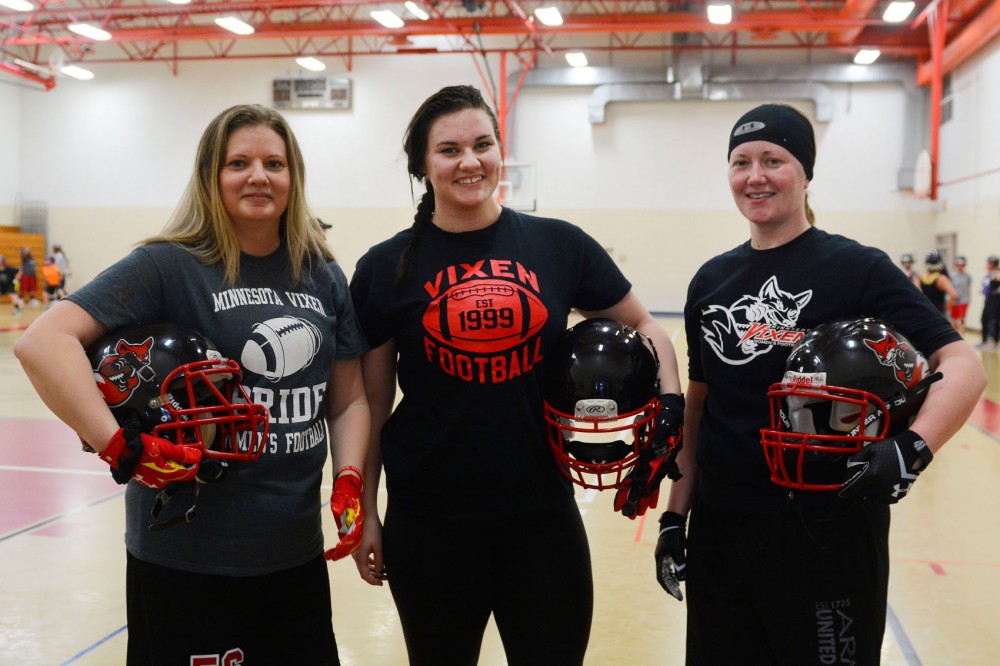The sound of squeaky shoes echoed off the walls of the Bethany Global University gymnasium on Saturday morning as players began stretching.
Though the practice was just beginning, beads of sweat were already falling from Minnesota Vixen players’ brows as they filtered into their position drills.
University of Minnesota student Nikki Graf was among them.
The Vixen, Minnesota’s women’s full-contact football team, began in 1999 and competes in the Independent Women’s Football League.
Graf and two University alumnae are three of 50 women on the Vixen’s roster, which is comprised of players ranging from 20 to 50 years old.
Graf’s addition comes on the heels of one of the largest tryouts in team history last fall, allowing the Vixen to put a deep roster together for the first time in the franchise’s history.
“We had over 80 people registered for tryouts this year,” player and team owner Laura Brown said.
The team struggled to find players in the past, but that all changed after Brown and her husband, James, took over as its owners.
Building a brand
Laura Brown — who earned her doctorate of pharmacy from the University in 2012 — was sitting in a cafeteria at the hospital where she was doing her residency when she first heard about the Minnesota Vixen.
“There was another lady who was sitting across from me watching it, too, and we were both making a lot of comments,” Laura Brown said. “Somebody else asked, ‘How do you women happen to know so much about football?’”
Brown said she told the lady her knowledge of the game comes from her love of football.
The woman whom Laura Brown was speaking with happened to be a Vixen player.
“She told me about the team,” Laura Brown said. “Once I participated in a practice, I was pretty much hooked.”
But after she spent one year as a player, the team needed new owners.
“[The previous owners] floated [the idea] out to a few players — people who might be interested in acquiring the team,” James Brown said. “Laura was interested in giving it a go, so we stepped forward.”
Since then, the Browns have made it their goal to get the word out about the team they now oversee.
“When I go around the metro and I wear a Vixen T-shirt, so many people still come up asking me, ‘Hey, what is the Vixen?’” James Brown said. “That’s a huge challenge from a business perspective since we’ve been here since 1999.”
Training the newbies
Nikki Beyer — a 2007 University graduate — spent her time in college playing intramural volleyball and flag football.
But she never played organized tackle football.
“[Flag football] was a lot of fun,” Beyer said. “It wasn’t as intense, obviously, as this is, but it was still nice to be able to play football because girls don’t really get that chance when [they’re] growing up. … It was always something I had to watch.”
Not many women on the team played the sport growing up, but head coach Brandon Pelinka said training inexperienced athletes is something he’s accustomed to.
“A lot of [practice] time is fundamental time,” Pelinka said. “Basically, we’re teaching it like we’re teaching from fourth grade on up.”
However, some of the players do have an advantage when it comes to their knowledge of the game.
“Some of them come in and they have no knowledge of it,” Pelinka said. “Then we have some that did play in high school or were fortunate enough to play earlier.”
Growing up, Laura Brown tried to get some experience by trying to join a boys’ league.
But even after pleading with her mother, her efforts were to no avail.
By motivation only
Unlike their male counterparts in the NFL, the Independent Women’s Football League players do not get paid.
Beyer said many women on the team are trying to balance football with their jobs, raising children and their marriages.
“I work full time,” Beyer said. “And then there [are] women [who] are going to school, working full-time, have kids, have families; I don’t know how they do it. … But we all manage to get here.”
The players aren’t motivated to play because of a paycheck, but rather because they simply love the game of football.
“There’s been times where players have stepped up and ran the team,” Laura Brown said. “It’s a lot of work, and you don’t get paid, really. … It’s a job that’s really more of a passion.”


